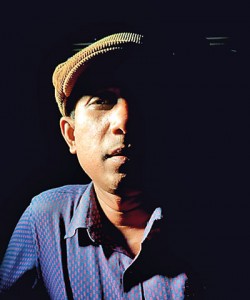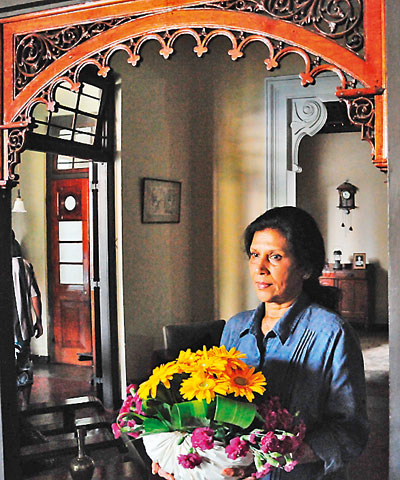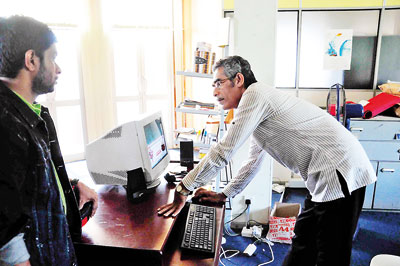Films are not market products; Malaka Dewapriya
The winner of the ‘Best cinema of tomorrow’ award at the recently held Derana Film awards, young filmmaker Malaka Dewapriya who made ‘Bahuchithavadiya’ or ‘The Undecided’ stresses that art is not a market product but a creative art that comes as genuine expression of the artistes.

Chandani Seneviratne, Samanalee Fonseka, Malani Fonseka and Malaka with the ‘Best cinema of tomorrow’ award
With a strong belief that an artistic creation that is made for the sake of art will last long but commercial scrap produced with the hope of monetary gain only would soon be forgotten, this young filmmaker strongly believes that filmmakers should be bold enough to swim against the current and should not give up the fight.
Malaka’s maiden film ‘Bahuchithavadiya’ was critically acclaimed and won rave reviews as a film that represented a new genre for Sri Lankan cinema. The film revealed the bitter realities of the present younger generation, their hopes and aspirations.
“What I want to do is to capture the reality of the present day younger generation and how they are being used by those around them and the system and how they try to use those around them to achieve their goals,” says Malaka.
“The aim of my art is to analyse contemporary society. I did this in radio dramas I made and ‘Bahuchithavadiya’ is only an extension of them. For the past five years I have been working on this mission.
The young filmmaker has captured the complex and intricate issues faced by today’s youth. “I don’t know what is going to happen in the next 25 years. When Dr. Dharmasena Pathiraja made ‘Ahas Gawwa’ (One League Of Sky) in 1974, at a time when there was a closed economy, he did not know what was going to happen after 1977 with a complete change of the economic system,” Malaka analyses.
“I make my art from what I see in this society and what is happening at this moment. This is the society that we are going through right now”.
“This is what I see and experience. I am not a craftsman or a businessman. An artiste has a criticism about the contemporary society. His duty is to express and expose what he observe and so I do the same,”.
Questioned as to whether he accepted that a cinema is an industry and it is a profitable business, Malaka revealed a completely different opinion.
“I am not a craftsman or a businessman. What I am doing is art. These are my expressions. What I make is not a commodity for the market.

Malaka Dewapriya
I strongly believe that any good art can be established in a society. This is common to cinema as well. If you observe the countries around us what Akira Kurosawa did in Japan, Satyajit Ray did in India and even what Lester James Peries did in Sri Lanka come under this form of art. I strongly believe that any good art can be socialized and inculcated to the society. The society will absorb this form of art. But what you dish out to the market would not become a part of the society. The good art will last long. So the role of the artistes should be create art that will live, last and change the society.
Having started his film five years ago and stopped halfway just after shooting, director Malaka now has taken the arduous responsibility of releasing it. There were a lot of obstructions to my film. I should have completed it in 2013. “I had to purchase the half made film from the production company by borrowing funds from 42 people including friends, lecturers at the university, teachers who taught me at my school and well wishers. Now I have taken up the challenge of distributing the film as well.
In order to complete and screen this film I have become indebted,” described Malaka unravelling the tragic reality of filmmaking in Sri Lanka.
“Some producers have alternative agendas in investing on cinema. They have no intention to complete the film. But for me I want to complete the film and show it to the people.”
“Sri Lankan cinema is handled by businessmen. They want us to do productions that can be sold. It is like the business of private bus transportation. The bus owner can decide whether to run the bus or not and when to stop. They decide the times and the schedules. They also see to it that the passengers, when travelling watch and hear the low-quality music and video of bus owners interest. The same procedure is followed by some film producers, distributors and circuit owners,” Malaka explains with a modern allegory.
But the young filmmaker seems to know the answer and the way to rescue cinema.
“We also had a transport service. In many countries transport is handled as a service. The Film Corporation should have intervened and helped protect the art of cinema,”.
“The timber corporation and or the steel corporation in the country try to protect timber and iron or regularise their usage. And similarly the National Film Corporation too should work to protect the art of cinema,” Malaka demands.
Malaka who studied cinema in Germany says there are alternative platforms that are created for artistic films in Germany. There are mobile theatres and places in underground train stations for this type of arts. Today Germany is the biggest art film promoting country in the world.
“At this moment there is a young cinema which is looming in this country. There are a number of young filmmakers making arty films but unfortunately there is no space or platform for them,”.

Scenes from ‘Bahuchithavadiya’




